- Home
- John Jakes
North and South: The North and South Trilogy Page 19
North and South: The North and South Trilogy Read online
Page 19
“That’s true,” Orry said.
“Of course I must never suggest that he’s the one responsible.”
“He doesn’t permit you to have ideas like that, eh?”
“He doesn’t permit me to have any ideas at all.”
For the next hour they spoke of all sorts of things: His friend George. The war that would take the two of them to Mexico and, presumably, combat. Priam’s disobedience and punishment, and the resulting uproar in the family. Somehow none of it seemed very real. For a little while no universe existed except this hidden place, no force within it except their love.
At last, though, the sun started down, and the light began to change. Madeline rose. “I must go. I can’t come here again, my sweet Orry. Kiss me good-bye.”
They embraced and caressed and spoke their feelings for a few tremulous minutes. Then he helped her mount. As she guided her horse around the ruined foundation, sitting sidesaddle gracefully, she looked back, then reined in.
“When you’re back from Mexico, I’m sure we’ll see each other occasionally. At parties, weddings. And whenever I look just at you, you’ll know exactly how I feel. Oh, Orry, I love you so!”
It was a declaration of joy and a cry of pain. She rode out of sight, and he started homeward twenty minutes later. He almost wished the meeting had never taken place. It had only ripped open a great inner wound that had scarred over once but now would never heal.
10
AFTER SUPPER THAT NIGHT, George and Orry strolled down to the boat landing while George smoked a cigar. Orry hadn’t explained his absence, and he was obviously on edge. That and the events of yesterday put George in a testy mood as well.
They sat on a couple of old kegs, watching the Ashley reflect the first evening stars. Suddenly a door banged up at the house. They saw Clarissa rush down the lane leading to the slave community.
“She looks upset,” George said.
“I expect Priam’s taken a bad turn. Brett told me Mother went to the sick house twice this afternoon.”
George let smoke trail from his nose and mouth. “She’s very conscientious about caring for your slaves, isn’t she?”
“With good reason. They don’t know how to care for themselves. They’re like children.”
“Maybe that’s because they’re not permitted to be anything else.”
“Oh, come on. Let’s not debate.”
“Debating’s for politicians. I was merely expressing an opinion.”
“I trust you’re finished,” Orry snapped.
Orry’s tone told George that it would be wise for him to say nothing more. Somehow he couldn’t do that. His conscience was deviling him—an unexpected occurrence—and he wouldn’t be content or honest if he failed to express what was on his mind. He spoke quietly but with firmness:
“No, not quite. Your family’s wonderful, Orry. Gracious. Kind. Very enlightened in many ways. The same can be said of most of your neighbors. The ones I’ve met, anyway. But slavery, now—well, I agree with your brother. Slavery’s like a lump of food that can’t be swallowed, no matter how hard you try.”
“I thought you never worried about such things.”
“I never did. Until yesterday.” George tapped ash from his cigar. “What did they do to that slave?”
Orry kept his eyes on the star-flecked river. “I don’t know. Whatever it was, it was necessary.”
“But that’s what I can’t swallow. It shouldn’t be necessary for one human being to hurt another. If the system makes it necessary or condones it, the system is wrong.”
Orry stood, glowering. George was stunned by the sharpness in his friend’s voice.
“Let me tell you something about Southerners. Southerners get tired of Yankees self-righteously criticizing everything that goes on down here. Cooper had some tales to tell about the sordid living conditions of workers from the Hazard mill. Is economic slavery any less reprehensible than what you complain about?”
George, too, was on his feet. “Wait a minute. Those mill workers—”
“No, you wait. The North should clean up its own house before it starts pointing fingers. If there are problems in the South, Southerners will solve them.”
“Doesn’t appear to me that you’re solving anything, my friend. And you get damn smug and feisty if anyone suggests you get cracking.”
“We get feisty when Yankees suggest it. We get angry as hell. The North’s been interfering in the affairs of the South for thirty years. If that continues, it can lead to only one thing.”
“A separate slaveholding government? Your Southern cronies at West Point were always trotting out that threat. Well, go ahead. Secede!”
“No, I’m not threatening that,” Orry countered. “But I do promise trouble, and plenty of it, to any outsider who insists on telling South Carolinians how to think and behave.”
“Does the term outsider include me?”
“You’re damn right,” Orry said, and walked away up the pier.
George considered packing up and leaving that night. But he didn’t. He knew Orry was deeply troubled, and he suspected the reason had nothing to do with the subject of their argument. Still, the quarrel disturbed him. It gave him a new and somber insight into the nature of the slave question.
He could understand that casual acquaintances or natural opponents such as politicians might fall out over slavery. But if it could threaten the relationship of good friends, it was a deep and potent issue indeed.
The next few days passed in an atmosphere of tension and forced politeness. The friends didn’t patch up their differences until the night before they were scheduled to leave for Charleston. It was Orry who took the initiative after several rounds of drinks.
“Look, we’re supposed to be fighting Mexicans, not each other.”
“Absolutely right,” George responded with vast relief. “I’m sorry I stuck my nose into your affairs.”
“I’m sorry I tried to chop it off.”
They renewed and repledged their friendship with another drink. But the memory of that quarrel, and its cause, remained with each of them.
A coastal steamer carried them around Florida into the Gulf. The sea was rough. During the first few days, George spent a lot of time hanging over the rail. When the steamer put into New Orleans to reprovision, he was grateful to stagger onto dry land for a few hours.
He and Orry strolled the levee and the old quarter, then drank bitter black coffee in a café. George had bought three papers, and after ordering a second coffee, he caught up on the news. In late September General Taylor had invested and captured Monterrey and was an even greater hero as a consequence. Politicians were saying Taylor would be the next Whig candidate for President, unless his superior, General Scott, also a Whig, had ambitions of his own. In the far West, Americans were rapidly overcoming Spanish California, which the United States had already annexed by proclamation.
Sometimes George found it hard to believe that his country and Mexico were at war; little more than twenty years ago, the Mexican government had invited Yankee colonization of the state of Coahuila y Texas and had granted concessions to the American empresario Moses Austin so that he could secure the wanted settlers.
Of course that had taken place in what amounted to the last hours of Spain’s long rule in Mexico. The country soon won its independence, and that seemed to be the start of all the trouble. The Constitution of 1824 was repeatedly subverted by revolution. Governments rose and fell with dizzying speed.
The year 1836 brought the short, brutal struggle for Texas independence. Early in March of that year, the Texans defending the Alamo mission were massacred. Little more than a month later, Sam Houston’s men won the war and the republic’s freedom at San Jacinto. Mexican resentment had simmered ever since.
One name that had been associated with Mexican-American relations for the past two decades was back in the news once again, George discovered. General Antonio López de Santa Anna had voluntarily returned from exile in
Cuba with his retinue and his seventeen-year-old wife. Presumably he was about to take command of the Mexican army, and not for the first time.
Tough, wily Santa Anna, now fifty-two, had fought for so many sides and factions, it was almost necessary to consult some kind of printed program to understand his career. He had served Spain as a young army officer, then joined the rebellion against the mother country. He had been, at various times, Mexico’s military chief, president, and dictator. He had won the sanguinary victory at the Alamo, then lost at San Jacinto, where he had been ingloriously captured while attempting to escape disguised in a dirty smock and carpet slippers.
At Tampico, defending his country against an attempted Spanish reconquest, the self-styled Napoleon of the West had lost a leg. The leg had subsequently been enshrined and displayed in Mexico City when he was in power, then dragged through the streets by mobs when his fortunes changed. You certainly had to admit the man was a survivor, George said to himself. Santa Anna went with the prevailing winds, and nothing exemplified this better than the current border dispute.
As a defeated general, Santa Anna had personally signed the 1836 peace treaty acknowledging the Rio Grande as the Texas boundary. Now he was declaring that although his name had indeed gone onto the document, he was the only one who had signed; the Mexican government, in other words, had not. Hence, Mexico had every right to repudiate the treaty and fight for the disputed territory—under Santa Anna’s command, naturally.
When George tried to discuss some of this with Orry he found his friend uninterested. He wondered about the reason for Orry’s long face until he remembered that Madeline LaMotte came from New Orleans. George immediately said he would just as soon go back on board and write a long-delayed letter home.
Orry said he’d be happy to go. His spirits improved the minute they turned their backs on the city.
The steamer plowed on across the Gulf, bound for the mouth of the Rio Grande. A sudden storm, not unusual for the season but this time especially severe, damaged the vessel’s port paddle wheel, forcing the captain to anchor off Saint Joseph Island to effect repairs. Lighters took all the military passengers ashore to Corpus Christi. Sometimes known as Kinney’s Ranch, the place was a miserable village of about forty shops and houses on the west bank of the Nueces River.
The friends went separate ways for a couple of hours. Orry was fascinated by the flat, sandy terrain of the Texas coast. Strolling the muddy main street, he was amazed to see half a dozen antelope browsing behind the unpainted buildings. He absorbed a shopkeeper’s warning about tarantulas and passed it along to George when they met. His friend, however, was interested in other forms of wildlife. But his report was discouraging.
“I’ve seen exactly one girl. Her face would crack a rock. Maybe I’ll have better luck tonight.”
“Where?”
“At the social. The local residents are putting it on for all the poor stranded soldiers. I swear, if I don’t get to squeeze a feminine waist pretty soon, I’ll go berserk.”
The social was held in a barn on Colonel Kinney’s trading post. Lanterns had been hung and some moth-eaten bunting tacked to the rafters. There was fresh straw on the dirt floor, a fiddler, a trestle table crowded with cakes, pies, and tarts, and a huge bowl of whiskey punch. About eighty officers and noncoms attended, and perhaps half as many townspeople, of which only seven were female. Of these, just one was attractive, and she got most of the attention.
She was worthy of it. She was a slender, stunning redhead in her early twenties. Her skin was white as thick cream and her eyes the bluest George had ever seen. He wasn’t daunted by her surprisingly tall height or by the dozen officers already surrounding her.
Some were majors and colonels. They would surely pull rank on him if he tried a direct assault. The enemy had to be outflanked. While the fiddler tuned up, George drifted to the punch bowl, smiling and introducing himself to various townsmen. In five minutes he had made a discovery and formulated a plan.
He strode firmly as he approached a civilian standing in the large open doorway of the barn. George knew he cut a good figure. He had spent half an hour scrubbing travel grime off his light blue trousers and polishing the brass hilt and scabbard decorations of his yard-long infantry officer’s sword.
The man he wanted to impress was a ruddy, stub-nosed fellow with short, unruly hair that was more white than red. He wore an old-fashioned suit of black broadcloth. George toasted him with his punch cup.
“A splendid party, sir. You Texans are good hosts.”
With a wry smile, the man answered, “In wartime, Lieutenant, patriotism sometimes outweighs prudence.”
“I don’t understand, sir.”
“In Corpus Christi, public opinion of soldiers is about as low as it can get. Zach Taylor’s troops camped here on their way to the Rio Grande. That was an experience this town won’t forget. Fortunately, Texans know how to protect themselves—and their daughters.” He clapped a hand on the immense holstered pistol hanging at his right hip. The barrel was almost a foot long. A Paterson Colt, George thought, perhaps a .36-caliber.
“Oh, do you have a daughter with you tonight?”
The red-faced man gave him an amused look. “I didn’t say that, my lad. But you apparently possess the information. Is that why you came over to talk to me?”
George gulped, then laughed. “And I thought I was being subtle. You’re right, sir. I knew I didn’t stand much of a chance of meeting her with that crowd around her. An introduction from you would give me an advantage.”
“You may not be subtle, sir, but you’re clever. However, I can’t introduce you until I know your name.”
“Lieutenant George Hazard, Eighth Infantry.”
The stocky man put out his hand. “Patrick Flynn. Born in Cappamore, County Limerick, but I fancy I’m a Texan now. Been here long enough! Arrived the year after Colonel Kinney opened his trading post. Lost my wife that same year, but Constance and I have managed to survive—even though there’s hardly enough legal business to keep a flea from starving.”
“You’re a lawyer? In this town?”
“I occasionally spend a month in San Antonio. That’s where I really make my living. They’re very disputatious in San Antonio. I did my reading of the law way up in Belfast. Very good training—all the shipping in Belfast Lough created legalistic tangles on every conceivable subject. A series of misadventures brought me to Texas while Sam Houston was struggling to wrest it away from the Mexicans. I settled in Corpus Christi because I thought this would become a port city with plenty of work for lawyers.” Smiling wryly again, he added, “Development has failed to keep pace with my hopes.” He threw his head back and drained his whiskey punch. “Or my thirst.”
“But you must like it here.”
“Oh, indeed.” Flynn nodded. “There’s free air and free space—and none of the snobbish restraints I encountered as a boy in the old country. Some of the local citizens distrust my Roman faith, which I can’t practice since there’s no Catholic chapel hereabouts, but that makes us even, since I dislike the prevailing view of slavery.”
“I’ve heard most Texans support it.”
“I regret to say that’s true. I often remark that a man always works harder for the carrot of personal advancement than he does for the stick of the slave overseer. But that’s a truth my neighbors don’t care to hear. Most confine themselves to grumbling and cursing, but there are a few hotheads who would like to run me out for daring to say such a thing. They don’t because they know I am, shall we say, self-reliant.”
He grinned and again touched the handle of his Colt. “But you want to meet Constance.”
“Yes, I do. Very much.”
“I’ll be happy to present you as soon as I rescue her from that pack of dullards—not one of whom displays your imagination. Are you perchance Irish?”
George laughed. “No, sir.”
“I shall attempt to overlook the deficiency.”
The lawyer strod
e off. George straightened his collar, saw Orry bearing down and signaled him away. Orry looked around, realized what was happening, and joined several other brevet lieutenants standing near the punch bowl with morose expressions.
Patrick Flynn snatched his daughter out of the group of senior officers. George tried to ignore their hostile looks and fix his attention on the girl. Half annoyed, half amused by the way her father had grasped her wrist and tugged her away, she allowed herself to be brought to George and presented.
“Constance, this is Lieutenant Hazard. He wanted to meet you and knew he stood a better chance if he spoke to me first.”
“But how did he know I’d want to meet him, Father?” the girl asked with a tart smile.
George strained to stand as tall as he could. Lord, I’m still two inches shorter. He grinned and looked straight into her brilliant blue eyes.
“Give me five minutes, Miss Flynn, and I’ll remove all doubt.”
Constance laughed. She spied a fiercely mustached major of dragoons stalking them, then took hold of George’s hand.
“Dance with me, Lieutenant, or we won’t even get that five minutes.”
He needed no further prompting. The fiddler was scratching out a waltz. George swept Constance past the fuming major and on across the floor. She was soft and sweet-smelling in his arms; so deliciously lovely that he was extremely careful about the way he held her. She noticed:
“Your touch is very light, Lieutenant. Are you afraid I’ll shatter?”
“Why, no, you’re not brittle, you’re exceedingly sof—that is—”
He strangled on the sentence. What the devil was wrong with him? He didn’t usually act this way with a girl. He was behaving like Orry, who was watching him from the punch table. Orry had a big, smug grin on his face.
For the remainder of the dance, they exchanged inconsequential remarks. He told her a few things about West Point and about his home in Pennsylvania. She repeated much of the information her father had given him. George’s head swam. He simply couldn’t select the right words, let alone deliver them with anything approximating charm. Constance, on the other hand, was completely at ease, smiling and chatting without the slightest awkwardness.

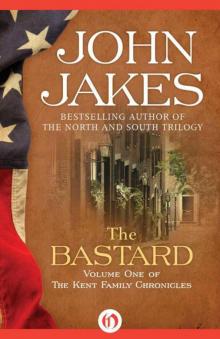 The Bastard
The Bastard The Furies
The Furies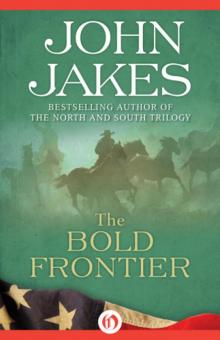 The Bold Frontier
The Bold Frontier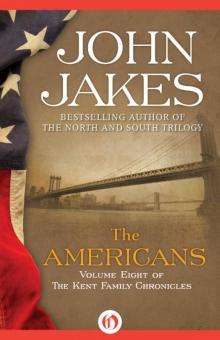 The Americans
The Americans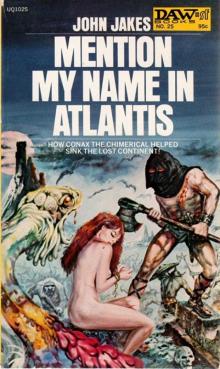 Mention My Name in Atlantis
Mention My Name in Atlantis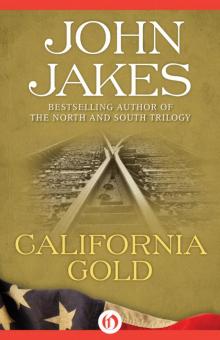 California Gold
California Gold North and South
North and South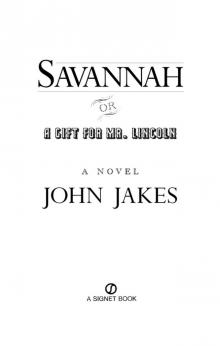 Savannah, or a Gift for Mr. Lincoln
Savannah, or a Gift for Mr. Lincoln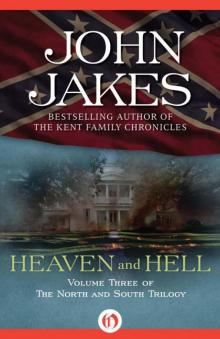 Heaven and Hell
Heaven and Hell Homeland
Homeland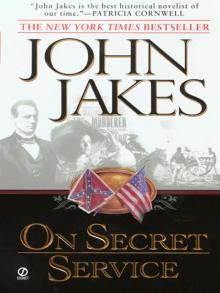 On Secret Service
On Secret Service The Lawless
The Lawless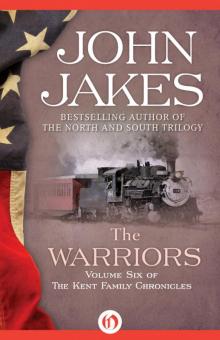 The Titans
The Titans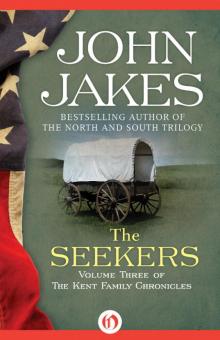 The Seekers
The Seekers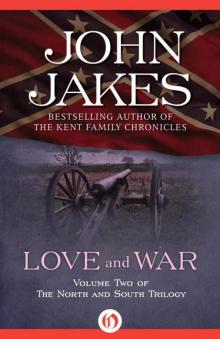 Love and War
Love and War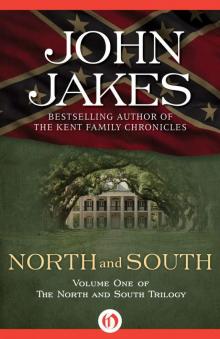 North and South: The North and South Trilogy (Book One)
North and South: The North and South Trilogy (Book One)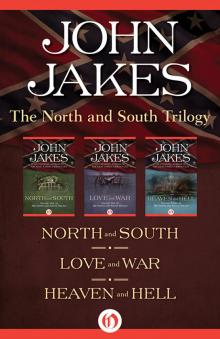 North and South Trilogy
North and South Trilogy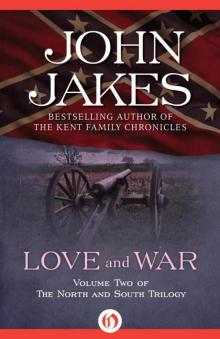 Love and War: The North and South Trilogy
Love and War: The North and South Trilogy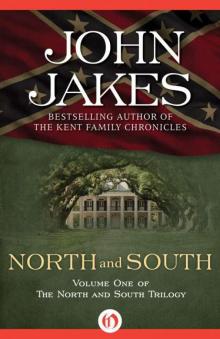 North and South: The North and South Trilogy
North and South: The North and South Trilogy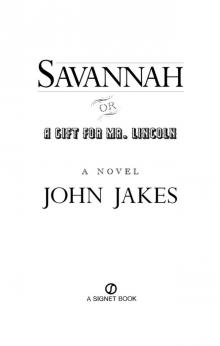 Savannah
Savannah Lawless
Lawless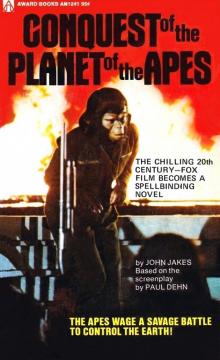 Conquest Of The Planet Of The Apes
Conquest Of The Planet Of The Apes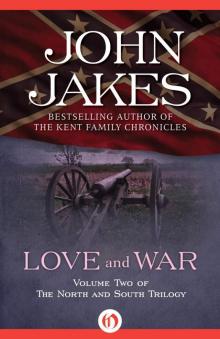 Love and War: The North and South Trilogy (Book Two)
Love and War: The North and South Trilogy (Book Two)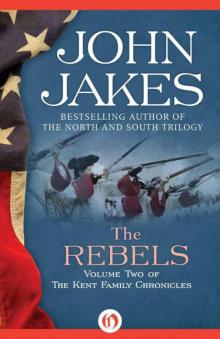 The Rebels: The Kent Family Chronicles
The Rebels: The Kent Family Chronicles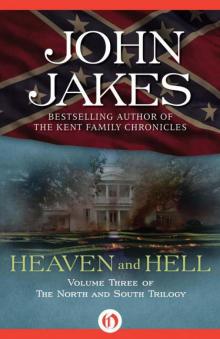 Heaven and Hell: The North and South Trilogy
Heaven and Hell: The North and South Trilogy Planet of the Apes Omnibus 2
Planet of the Apes Omnibus 2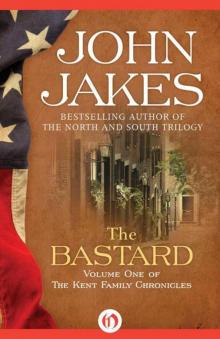 The Bastard: The Kent Family Chronicles
The Bastard: The Kent Family Chronicles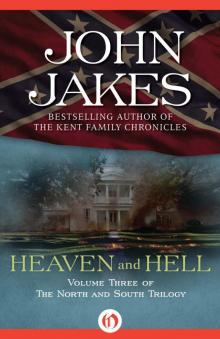 Heaven and Hell: The North and South Trilogy (Book Three)
Heaven and Hell: The North and South Trilogy (Book Three)